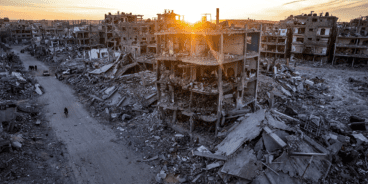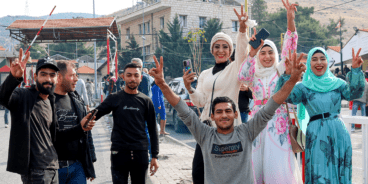Atrocity Alert No. 149: Syria, Venezuela and Israel and the Occupied Palestinian Territories
Atrocity Alert is a weekly publication by the Global Centre for the Responsibility to Protect highlighting situations where populations are at risk of, or are enduring, mass atrocity crimes.
Dangerous military escalation as airstrikes and artillery kill 170 civilians in Idlib, Syria
Syrian government forces continue to increase airstrikes and artillery fire on the region of Idlib, killing at least 170 civilians in the last four weeks. The majority of these attacks, which may violate international law, occurred in densely populated areas along the M5 highway connecting Aleppo to Damascus. Nearly three million civilians currently reside in Idlib Governorate, the last major region of Syria still controlled by armed opposition groups.
During September 2018 Russia and Turkey signed a Memorandum of Understanding aimed at avoiding a deadly escalation between Syrian government forces and armed opposition groups in Idlib Governorate. Despite agreeing to the creation of a 15-kilometer-wide demilitarized zone, the agreement has not been fully implemented. Attacks on Idlib increased after armed extremists from Hayat Tahrir al-Sham (HTS), Syria’s al-Qaeda affiliate, consolidated their control over the area during January 2019. There have been repeated warnings from humanitarian organizations and human rights groups that any major government offensive on Idlib would be catastrophic.
Meanwhile, the monthly report of the Syrian Network for Human Rights (SNHR) announced that at least 334 civilians, including 85 children and two Syrian Civil Defense (White Helmets) humanitarian workers, were killed across Syria during March. The report attributes responsibility for the majority of these deaths to Syrian government and Russian forces, but also blames armed extremist groups such as HTS for torturing and killing civilians. The report called upon the UN Security Council to uphold and “implement the principle of the responsibility to protect civilians’ lives” and refer the situation in Syria to the International Criminal Court.
The protection of civilians must be at the center of any attempt to confront HTS and other armed extremist groups in Idlib and elsewhere. Despite the Syrian government and its allies, Russia and Iran, insisting that the civil war in Syria is coming to an end, the situation in Idlib and the SNHR report demonstrates that civilians continue to face the threat of war crimes and crimes against humanity. Without tangible progress toward an inclusive political process and a nationwide ceasefire, in accordance with UN Security Council Resolution 2254, the normalization of diplomatic relations with the Syrian government would reward perpetrators of atrocities for their crimes and may recklessly endanger the lives of millions of civilians still living in Idlib.
Blackouts and Venezuela’s humanitarian and human rights crisis
Over the weekend of 30-31 March protesters took to the streets of Caracas and other Venezuelan cities to demonstrate against nationwide power outages resulting from years of mismanagement of the country’s electrical infrastructure. The blackouts, which began on 7 March, have exacerbated a humanitarian crisis that, according to the UN, has left a quarter of the population in urgent need of assistance. The outages have resulted in a lack of clean drinking water, prevented hospitals from functioning and led to the shutdown of other basic public services. Meanwhile, the International Committee of the Red Cross announced on 29 March that it had negotiated with the government for the safe delivery of life-saving humanitarian aid from neighboring states in an attempt to deal with ongoing shortages of food and essential medicines.
The political crisis in Venezuela escalated when President Nicolas Maduro began his second term in office on 10 January following allegations of fraudulent elections and chronic mismanagement of the economy. More than 50 countries rejected Maduro’s inauguration and have recognized opposition leader Juan Guaidó as interim President of the country instead.
The worsening economic and social crisis has led to a renewed crackdown on protests. In addition to official state security forces, the government has also deployed armed paramilitaries, called “colectivos,” to attack its opponents, resulting in arbitrary detentions, torture and extrajudicial killings. During 2018 a panel of independent experts mandated by the Organization of American States (OAS) concluded that these attacks by the government and its armed auxiliaries amounted to potential crimes against humanity. Since the electricity blackouts began in March, Maduro has called on armed colectivos to help police the streets.
On 21 March the OAS General Secretary, Luis Almagro, and the Stanley Foundation hosted a historic event on the principle of the responsibility to protect in the Americas. Much of the discussion focused on the crisis in Venezuela, with panelists including Venezuela’s former Ambassador to the UN, Diego Arria, and former Foreign Minister of Costa Rica and Deputy Executive Director of Human Rights Watch, Bruno Stagno Ugarte, as well as Executive Director of the Global Centre for the Responsibility to Protect, Simon Adams, and others. Almagro commented that, “in Venezuela, we have an organized structure that is committing crimes against humanity. We have to find appropriate responses.” Several panelists argued that the Maduro government has created a catastrophic human rights, humanitarian and migratory crisis that the international community can no longer ignore.
Ongoing Gaza conflict threatens both Israeli and Palestinian civilians
Last Saturday, 30 March, marked one year since the start of the “Great March of Return and the Breaking of the Siege” protests organized by Palestinians in Gaza. Over the past year the Israeli Security Forces (ISF) have responded to the protests with disproportionate and deadly force, with army snipers often using live ammunition against unarmed civilians. During Saturday’s protests four Palestinians were killed and over 300 injured.
The UN Human Rights Council-mandated Commission of Inquiry into the protests found that the ISF killed 187 civilians and wounded more than 6,000 during 2018. The Commissioners found reasonable grounds to believe that the use of live ammunition against protestors was unlawful and that the ISF killed and maimed Palestinian demonstrators who did not pose a threat to others, and/or were not directly participating in hostilities. The ISF also deliberately shot paramedics, journalists and children, in violation of International Humanitarian Law. Israel has rejected the findings of the report.
There have also recently been significant clashes between the ISF and armed groups operating within the Occupied Palestinian Territories. On 25 March two rockets were fired from Gaza towards the city of Tel Aviv, destroying a home, wounding seven civilians and prompting Israel to respond with airstrikes on an estimated 100 Hamas targets inside Gaza. Following last week’s hostilities, Egypt brokered another ceasefire between Israel and Hamas. However, with elections in Israel scheduled for 9 April, there is potential for further armed provocations and deadly conflict.
As protests continue along the Gaza border, Israel should take all necessary steps to end the use of disproportionate and deadly force against unarmed Palestinian protestors. Israel must also lift the blockade on Gaza – a form of collective punishment of Gaza’s 1.8 million residents that is illegal under international law. The Hamas de-facto administration in Gaza must permanently halt indiscriminate rocket attacks on Israel and end its own violent crackdown on civilian protests. Despite the recent escalation of hostilities, states with strong political and economic ties to Israel, the Palestinian Authority or Hamas should push for the resumption of formal negotiations and a lasting political solution to the Israeli-Palestinian conflict.
Read Next
Related Publications

Atrocity Alert No. 424: Israel and the Occupied Palestinian Territory, Sudan and Haiti

Atrocity Alert No. 421: Syria, Haiti and Genocide Remembrance and Prevention
